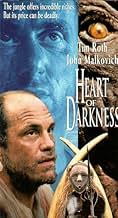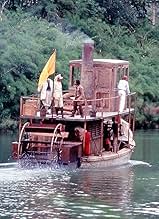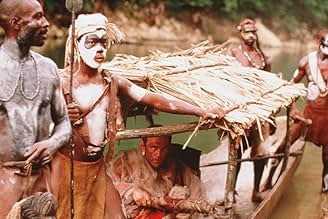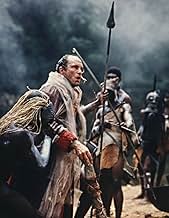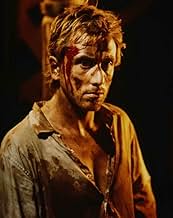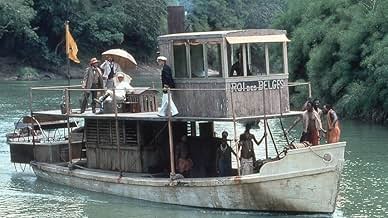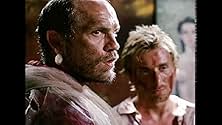CALIFICACIÓN DE IMDb
5.7/10
2.2 k
TU CALIFICACIÓN
Agrega una trama en tu idiomaA trading company manager travels up an African river to find a missing outpost head and discovers the depth of evil in humanity's soul.A trading company manager travels up an African river to find a missing outpost head and discovers the depth of evil in humanity's soul.A trading company manager travels up an African river to find a missing outpost head and discovers the depth of evil in humanity's soul.
- Dirección
- Guionistas
- Elenco
- Ganó 1 premio Primetime Emmy
- 3 premios ganados y 3 nominaciones en total
- Dirección
- Guionistas
- Todo el elenco y el equipo
- Producción, taquilla y más en IMDbPro
Opiniones destacadas
Heart of Darkness (1993 TV Movie) was directed by Nicolas Roeg. It's based on the famous novel by Joseph Conrad. Tim Roth stars as Marlow, a young seaman who is hired to captain a steamboat up the Congo River into (then) The Belgian Congo.
Roth is a competent actor and he makes us believe in Marlow. John Malkovich portrays Kurtz. Everything in the novel rotates around Kurtz, but we don't see Kurtz until late in the novel. In reality, Roth is the star, and Malkovich is playing a supporting role.
Isaach De Bankolé depicts Mfumu, a relatively minor figure in Conrad's novel, but a more significant figure in the movie. He is an African worker with whom Marlow bonds.
However, as many critics have pointed out, Conrad's novel is written about Europeans and it's meant for Europeans. It portrays a time when colonialism was painted over with a thin veneer of enlightenment. This enlightenment was barely present anywhere in colonial Africa. In the Belgian Congo, everyone there knew it was a total pretense.
The movie would work somewhat better on the large screen, because some of the jungle views are breathtaking. However, we saw it on DVD, where it worked well enough.
Heart of Darkness has a terrible IMDb rating of 5.7. The movie is well acted and well produced. All I can assume is that people don't like Conrad's novel. That's not director Roeg's fault, but he gets the blame. In addition, Conrad's novel is based on his meticulously crafted paragraphs. The plot of the novel isn't as important as are Conrad's words.
Other than doing continual voiceover, there's no real way to bring Conrad's verbal genius to life. In movies, what you see is (literally) what you get. What we get is the story Conrad gave us, and apparently people don't like the story.
I don't think Heart of Darkness is a great movie, but I think it's an excellent movie and rated it 8.
Roth is a competent actor and he makes us believe in Marlow. John Malkovich portrays Kurtz. Everything in the novel rotates around Kurtz, but we don't see Kurtz until late in the novel. In reality, Roth is the star, and Malkovich is playing a supporting role.
Isaach De Bankolé depicts Mfumu, a relatively minor figure in Conrad's novel, but a more significant figure in the movie. He is an African worker with whom Marlow bonds.
However, as many critics have pointed out, Conrad's novel is written about Europeans and it's meant for Europeans. It portrays a time when colonialism was painted over with a thin veneer of enlightenment. This enlightenment was barely present anywhere in colonial Africa. In the Belgian Congo, everyone there knew it was a total pretense.
The movie would work somewhat better on the large screen, because some of the jungle views are breathtaking. However, we saw it on DVD, where it worked well enough.
Heart of Darkness has a terrible IMDb rating of 5.7. The movie is well acted and well produced. All I can assume is that people don't like Conrad's novel. That's not director Roeg's fault, but he gets the blame. In addition, Conrad's novel is based on his meticulously crafted paragraphs. The plot of the novel isn't as important as are Conrad's words.
Other than doing continual voiceover, there's no real way to bring Conrad's verbal genius to life. In movies, what you see is (literally) what you get. What we get is the story Conrad gave us, and apparently people don't like the story.
I don't think Heart of Darkness is a great movie, but I think it's an excellent movie and rated it 8.
Heart of Darkness by Joseph Conrad is among my favourite works in literature and have read it numerous times, never failing to be drawn into the story of Marlow and his journey up the river to encounter the mad and enigmatic Mr. Kurtz. Knowing only it being the basis for the Francis Ford Coppola film Apocalypse Now I was eager to see an adaptation that was going to be closer in nature to the Conrad novella and being directed by the great Nicolas Roeg it was bound to be interesting. But, alas, it was disappointing, to say the least. Being a fan of Nicolas Roeg and his striking visual style and fragmentary narrative he seemed liked an ideal director to get into psychology of the characters and their story. But the direction is lazy and uninspired, the performances by Tim Roth and John Malkovich are just dull.
Sadly we were robbed of a filmed version by Orson Wells which would have had Wells playing both Marlow as well as Kurtz---a very intriguing idea and has long been a theory of mine that the story should be read psychologically of a man confronting his own worst aspects. In the story we know from the beginning that he has survived his encounter with Kurtz but has been illuminated by this encounter, retelling of his adventure to his companions. There is no mystery to be found other than him looking into the abyss of his own soul as it is manifested by Kurtz. The Coppola film is better when it came to portraying the madness of Kurtz and the need by Willard to destroy him. The Nicolas Roeg film portrays Kurtz true to the source material as a sickly and dying man and devoid of any kind of threat or menace. Brando's Kurtz was a man struggling with the extremes of his soul: the primitive and the illuminated. We can only imagine how Wells might have depicted these characters. We were given only a tantalizing glimpse with two radio adaptations.
This is for fans of Nicolas Roeg. It was made late in his career when he was working increasingly limited budgets and his films during this period were a shadow of his early days, lacking the flair and energy. It's hard to believe this was the same man who directed The Man Who Fell to Earth, Don't Look Now, Walkabout, and Bad Timing.
Sadly we were robbed of a filmed version by Orson Wells which would have had Wells playing both Marlow as well as Kurtz---a very intriguing idea and has long been a theory of mine that the story should be read psychologically of a man confronting his own worst aspects. In the story we know from the beginning that he has survived his encounter with Kurtz but has been illuminated by this encounter, retelling of his adventure to his companions. There is no mystery to be found other than him looking into the abyss of his own soul as it is manifested by Kurtz. The Coppola film is better when it came to portraying the madness of Kurtz and the need by Willard to destroy him. The Nicolas Roeg film portrays Kurtz true to the source material as a sickly and dying man and devoid of any kind of threat or menace. Brando's Kurtz was a man struggling with the extremes of his soul: the primitive and the illuminated. We can only imagine how Wells might have depicted these characters. We were given only a tantalizing glimpse with two radio adaptations.
This is for fans of Nicolas Roeg. It was made late in his career when he was working increasingly limited budgets and his films during this period were a shadow of his early days, lacking the flair and energy. It's hard to believe this was the same man who directed The Man Who Fell to Earth, Don't Look Now, Walkabout, and Bad Timing.
The Heart of Darkness was unfortunetly hard to understand. fortunetly I had the choice to read the book first which simplified things in order to understand the book. Since the movie did not go in chronological order, it was a little hard to follow. Marlow was having flashbacks and such so you didnt know what was going on. The plot was a little brief... a young man goes to Africa and faces obsticles along the way! simple. I would give the acting a 7. they were good but they weren't perfect. Basically, The Heart of Darkness is about a young man who gets a job sailing down the Congo River to Africa. Earlier another young man by the name of Kurtz goes to Africa to collect ivory. After being in the jungle for so long it starts to get to Kurtz and he becomes an angry charismatic man who spends all his time collecting ivory. Their are many obstacles Marlow faces, from dying passangers to being attacked by natives. This movie is packed full of action and adventure. I would give this movie an overall rating of 8.
Overall, the movie "Heart of Darkness" was pitiful compared to the book. Anyone who has ever read the book and had a sufficient understanding of it would be able to see the countless obvious flaws. There is an immeasurable difference between the two. It seems to me that the director was walking into a losing battle. I couldn't imagine that someone would take on the monstrous task of recreating "Heart of Darkness." The immense detail and magic of the story would be impossible to justly interpret. Conrad's story had so many layers and so much depth that it would seem pointless to try to make a visual interpretation.
First, capturing the details of the story is unattainable. The colossal fine points created by Joseph Conrad cannot be rightfully recreated through film. Marlow's feelings and emotions cannot be equally construed in the movie. If you have taken on the enormous task of tackling Conrad's work then, you know as well as I that Conrad only wrote half the story. The additional half is a series of connections made by the reader. You, as the reader are required to be capable of inferring and connecting Joseph Conrad's ideas. As a result, several crucial details are absent in the movie.
Also, although the movie was an adequate length, the film seemed short. It seemed that Conrad was able to pack many more details into 75 pages than the movie could pack in an hour and a half. The speed of the movie kept the viewer from getting to know the characters. Marlow was much more of a stranger. The viewpoint of the book puts you into Marlow's shoes. However, in the movie, you're almost watching Marlow from a distance. I began to think that the director was trying to utilize the same "read between the lines" method as Conrad did. However, the connections were weak. I know that if I had not read the book then, I would, in no way, be able to begin to understand the depth of the situation and the characters.
Finally, Kurtz also seemed to be interpreted incorrectly. His role was short and the details weren't all included. It was impossible to comprehend the true Kurtz in the length of time he was shown. An important detail in the book was that Kurtz had become a god to the Africans. I didn't think that significant detail was defined. Also, in the book, Kurtz represented a soulless being. He had died inside long ago. I believe the director comprehended this detail. However, instead of recreating it, he just had Kurtz mope around and mumble everything. Moreover, it seemed like the director attempted to make Kurtz seem mysterious, however, instead, he seemed entirely unidentified.
Altogether, this movie reminded me of a teenager cramming to finish a science project, due the next day. It appeared to have been crafted effortlessly and in hardly any time. The characters were alienated, crucial details were left out, and, overall, the central plot was lost in translation.
First, capturing the details of the story is unattainable. The colossal fine points created by Joseph Conrad cannot be rightfully recreated through film. Marlow's feelings and emotions cannot be equally construed in the movie. If you have taken on the enormous task of tackling Conrad's work then, you know as well as I that Conrad only wrote half the story. The additional half is a series of connections made by the reader. You, as the reader are required to be capable of inferring and connecting Joseph Conrad's ideas. As a result, several crucial details are absent in the movie.
Also, although the movie was an adequate length, the film seemed short. It seemed that Conrad was able to pack many more details into 75 pages than the movie could pack in an hour and a half. The speed of the movie kept the viewer from getting to know the characters. Marlow was much more of a stranger. The viewpoint of the book puts you into Marlow's shoes. However, in the movie, you're almost watching Marlow from a distance. I began to think that the director was trying to utilize the same "read between the lines" method as Conrad did. However, the connections were weak. I know that if I had not read the book then, I would, in no way, be able to begin to understand the depth of the situation and the characters.
Finally, Kurtz also seemed to be interpreted incorrectly. His role was short and the details weren't all included. It was impossible to comprehend the true Kurtz in the length of time he was shown. An important detail in the book was that Kurtz had become a god to the Africans. I didn't think that significant detail was defined. Also, in the book, Kurtz represented a soulless being. He had died inside long ago. I believe the director comprehended this detail. However, instead of recreating it, he just had Kurtz mope around and mumble everything. Moreover, it seemed like the director attempted to make Kurtz seem mysterious, however, instead, he seemed entirely unidentified.
Altogether, this movie reminded me of a teenager cramming to finish a science project, due the next day. It appeared to have been crafted effortlessly and in hardly any time. The characters were alienated, crucial details were left out, and, overall, the central plot was lost in translation.
I loved the movie and I certainly loved the book, but I find Coppola's 'Apocalypse Now' as an allegory far more touching, involving and more beautiful. Mainly, 'Heart of Darkness'(TV) matches nor Roths intensity, nor Malkovichs presence. Which does not mean it isn't a tremendous attempt to adapt Conrads novel.
¿Sabías que…?
- TriviaWhen Orson Welles first set up his production deal with RKO in 1940, this was to be their first movie. Excessive costs made it too prohibitive and so they proceeded with El Ciudadano Kane (1941) instead.
- ErroresThe monkey in Kurtz' bungalow has a prehensile tail and is therefore not an African monkey, but a New World monkey.
- ConexionesFeatured in The 52nd Annual Golden Globe Awards (1995)
Selecciones populares
Inicia sesión para calificar y agrega a la lista de videos para obtener recomendaciones personalizadas
Detalles
- Tiempo de ejecución
- 1h 40min(100 min)
- Color
- Mezcla de sonido
- Relación de aspecto
- 1.33 : 1
Contribuir a esta página
Sugiere una edición o agrega el contenido que falta


